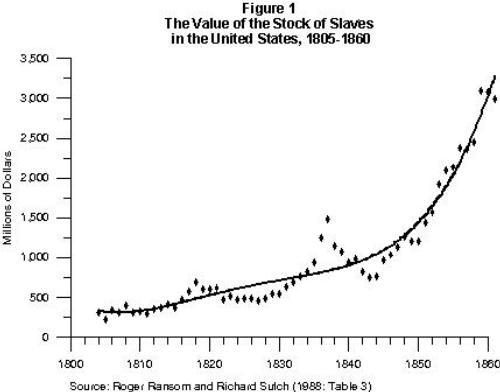Compensation, and Ron Paul’s Ahistorical History
 Ta-Nehisi Coates is one of the few authors remaining at the Atlantic who lives up to its reputation. In response to Ron Paul’s repeated insistence that the Civil War “didn’t need to be fought,” and as an implied rejoinder to libertarian insistence that the unConstitutional Civil Rights Act was an unnecessary intrusion into private affairs, he is writing a series of posts about compensated emancipation, by which the federal government would have bought all the slaves from all the slaveholders.
Ta-Nehisi Coates is one of the few authors remaining at the Atlantic who lives up to its reputation. In response to Ron Paul’s repeated insistence that the Civil War “didn’t need to be fought,” and as an implied rejoinder to libertarian insistence that the unConstitutional Civil Rights Act was an unnecessary intrusion into private affairs, he is writing a series of posts about compensated emancipation, by which the federal government would have bought all the slaves from all the slaveholders.
As he explains in the introduction, a series is needed to disprove a soundbite because
[…] Comfortable History is asymmetrical warfare it needs only a smattering of facts, and need not guard against a lack of context, presentism, or other facts that might undermine its arguments. Instead it breezily proceeds through hypotheticals and abstract thought experiments which somehow satisfy our desire to be in possession of a dissident intellect. Comfortable History is like the computer virus that poses as the shield — it positions the espouser as a brave truth-teller, even as it infects us with lies.
The first post is about Lincoln’s views of slavery and the southern response to his election: they seceded, raised an army, and fired on federal property, something commonly referred to as an act of war (which I like to call Treason In Defense Of Slavery). The South was not a democratic society where some people happened to own slaves, it was a slave society. Its leaders argued slavery was a moral good, as opposed to the necessary evil the framers considered it to be. Any threat to the institution of slavery was a threat to the South itself, so deeply ingrained was the practice.
The second is about the economic impossibility of the purchase (or alternately, how it would have led to the same expansion of federal power as a war, a common libertarian complaint). Furthermore, the government would either force slave owners to accept an unfair price (which is different from forcible emancipation only by degree, not type) or allow them to set an inflated price:
A government which buys slaves, with the explicit intent to buy all slaves, is in a poor bargaining position versus slaveowners.. Signalling your intention to buy up all the supply of a commodity on the market increases the price you’ll pay, whether that be bonds or human beings.
The latest installment provides several examples of other violent slave rebellions, putting the lie to Paul’s statement that “every other major country in the world got rid of slavery without a civil war.” Slave rebellions in Haiti, Brazil and Venezuela make the falsity of this assertion apparent, but the real point (which is made in passing regularity by Coates) is that Paul is implicitly talking only about violence that affects white people.
Read the whole thing.